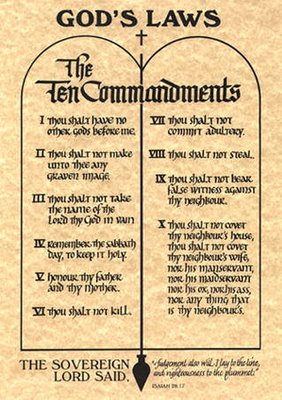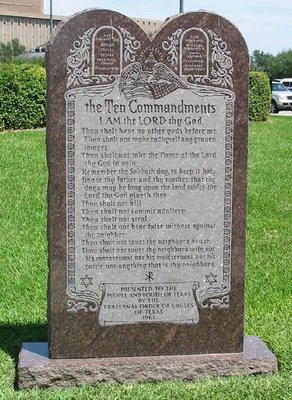
The Ten Commandments, or Decalogue, are a list of religious and moral imperatives which, according to the Bible, were written by God and given to Moses on Mount Sinai in the form of two stone tablets. They feature prominently in Judaism and Christianity. In Biblical Hebrew language, they are termed עשרת הדברים (Aseret ha-Dvarîm) and in Rabbinical Hebrew עשרת הדברות ( Aseret ha-Dibrot), both translatable as "the ten statements." The name "decalogue" is derived from the Greek name δέκαλόγοι or "dekalogoi" ("ten statements") found in the Septuagint, which is the Greek translation of the Hebrew name.
While the terms "Ten Commandments" and "Decalogue" generally refer to the passages in Exodus 20:2-17 and Deuteronomy 5:6-21, the only place where the term "ten commandments" is used in the bible is in referance to Exodus 34, commonly called the Ritual Decalogue, which may have pre-dated the "Ethical Decalogue" of Exodus 20 and Deuteronomy 5 covered here. The ten commandments in Exodus 34 contain many impartives that might not be familiar to the modern Christian, including a prohibition of cooking a baby goat in its mother's milk.
According to the Bible, God inscribed the Ten Commandments into stone: "God said to Moses, 'Come up to Me, to the mountain, and remain there. I will give you the stone tablets, the Torah and the commandment that I have written for [the people's] instruction.'" (Exodus 24:12) also referred to as "tables of testimony" (Exodus 24:12, 31:18, 32:16) or "tables of the covenant" (Deuteronomy 9 verses 9, 11, 15), which he gave to Moses.

The Ten Commandments on a monument on the grounds of the Texas State Capitol
The Ten Commandments are a summary of the immutable moral law. These commandments were first given in their written form to the people of Israel when they were encamped at Sinai, about fifty days after they came out of Egypt (Ex. 19:10-25).
They were written by the finger of God on two tablets (tables) of stone. The first tablets were broken by Moses when he brought them down from the mount (32:19), being thrown by him on the ground. At the command of God he took up into the mount two other tablets, and God wrote on them "the words that were on the first tables" (34:1). These tablets were afterwards placed in the ark of the covenant (Deut. 10:5;1 kings 8:9). Their subsequent history is unknown. They are as a whole called "the covenant" (Deut. 4:13), and "the tables of the covenant" (9:9,11; Heb 9:4), and "the testimony."
The Miracle of St Joseph
Shavuot and the Ten Commandments
Gods Ten Laws
No comments:
Post a Comment